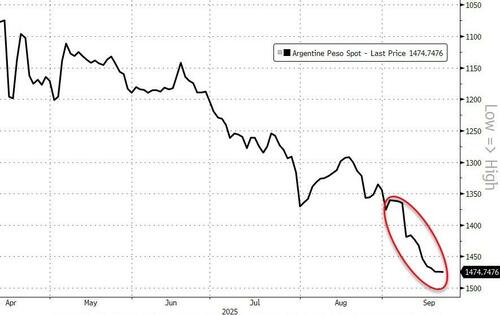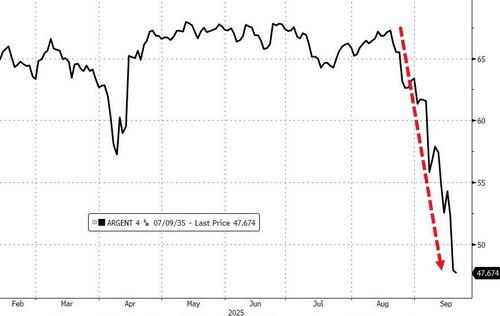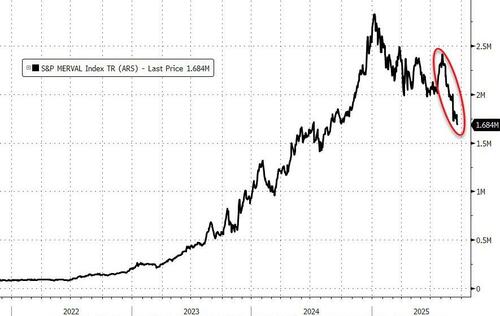


Following his government's resounding loss in local elections - seen as a harbinger of next month's congressional races - Argentine President Milei is facing a renewed crisis as the embattled South American country's currency is collapsing amid fears that he will scrap his defense of the peso (which has already cost hundreds of millions of dollars) and let it plunge as so many of his predecessors have done.
“The market,” Milei said when collared by a local journalist for a brief interview late Friday, is “in panic mode.”
In a desperate attempt to satisfy demand for hard currency and prevent the peso from cratering, the three-day intervention figure rose to $1.1 billion, a staggering amount in a country that, by economists’ best estimates, has less than $20 billion in liquid foreign reserves.
As Bloomberg reports, on Friday, he vowed to defend the peso at all costs, echoing the words of his top economic aide the day before.
“We will do everything we must do to protect the quality of life of Argentines.”
Milei is “spending currency reserves at a frenzied pace to prop up the peso that is in free fall,” Derek Holt, vice-president and head of capital markets economics at Scotiabank, wrote in a note.
“Fixing at this exchange rate would risk returning the country to rampant hyperinflation which Milei promised to end. The very essence of his reforms are in jeopardy and with that the unfortunate hopes of Argentinians too used to policy failures.”
Longtime Argentine observers see few options for Milei to stem the tide and regain confidence.
A strong showing in the Oct. 26 vote would be one. A fresh injection of cash from the International Monetary Fund or some other foreign aid agency would be another. Having just cut a $20 billion IMF deal in April, that may be unlikely though Milei intimated, after being asked Friday about financial aid from the US Treasury, that something may be in the works with some overseas institution.
Argentina bonds and stocks are also tumbling as investors are pulling money out of the country at a rapidly increasing clip.
“We trust in the program and we’re not going to move away from the program,” Economy Minister Luis Caputo said late Thursday on a podcast.
“We’re going to sell up till the last dollar in the ceiling of the band.”
As Bloomberg points out, it’s a stark change of fortunes for Milei, whose deep spending cuts and sweeping reforms had been welcomed by global investors soon after the libertarian economist took office in late 2023, setting off rallies across its financial markets. Inflation soon began to ease, falling below 100% and shoring up support for Milei for a while. But as he’s started to suffer political setbacks that hurt his ability to keep pushing through his agenda, the country’s bonds, stocks and currency have all come tumbling back down.
“It’s probably too soon to say that the story is crumbling, but certainly the new pieces of information that we’ve gotten in the last week have all been negative,” Christine Reed, emerging market local currency debt portfolio manager at Ninety One in New York, said in an interview.
“The outlook going into midterms has worsened dramatically.”
In the past few days, Milei’s rivals in the lower house of Congress ratcheted up their pushback against his austerity agenda. They rejected two controversial vetoes on education and health-care spending. The Senate is seen as even more hostile to the administration, meaning the higher spending will likely pass. The votes led to further slides in the country’s assets as they spell trouble for the second half of Milei’s term.
“We expect continued foreign exchange and asset price volatility between now and the national mid-term vote on October 26th,” Gramercy Funds Management said in a research note Friday.
“The challenging political backdrop and near-term implications for the macroeconomic landscape through the foreign exchange market has increased the probability of a liability management exercise next year.”
With his popularity tumbling, the victory by the left-wing Peronist opposition in the country’s main province, Buenos Aires, unnerved investors.
“We knew this year was going to be very complicated and we had already started developing strategies to cover next year’s debt payments,” Milei said.
“We’ve been working, those negotiations take time, but until something isn’t confirmed we don’t make announcements. But we are working very hard, we’re very advanced, and it’s also a matter of time.”
Time is not on Argentina’s side.
* * * Order by tonight for Monday shipping * * *




